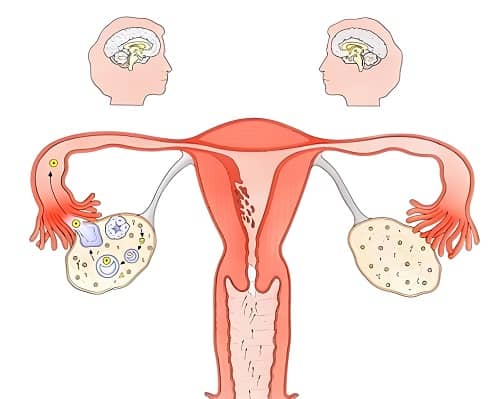The exact cause of Polycystic Ovary Syndrome (PCOS) remains unclear, but a combination of genetic, hormonal, and lifestyle factors is thought to play a significant role. Below are some of the potential contributing factors:

Table of Contents
- 1. Gonadal Development Abnormalities
- 2. Genetic Factors
- 3. Insulin Resistance
- 4. Hormonal Imbalances
- 5. Inflammatory Response
1. Gonadal Development Abnormalities
In some cases, the ovaries may develop abnormally, leading to the presence of testicle-like tissue within the ovaries (a condition known as testicular-like ovaries). This gonadal developmental abnormality can result in an imbalance in hormone secretion, which, in turn, affects menstrual cycles and ovulation.
- Impact: Irregular ovulation and menstrual dysfunction.
- Mechanism: The presence of abnormal tissue can alter hormonal levels, disrupting normal reproductive processes.
2. Genetic Factors
Women with a family history of PCOS are at a higher risk of developing the condition. While the specific genetic mechanisms are not yet fully understood, it is believed that inheritance plays a significant role in the development of PCOS.
- Impact: Increased likelihood of developing PCOS if a close family member has it.
- Mechanism: Inherited genetic factors may predispose individuals to hormonal imbalances or other underlying conditions that contribute to PCOS.
3. Insulin Resistance
Insulin resistance is commonly observed in women with PCOS. This condition leads to elevated insulin levels in the body, which can have a significant impact on ovarian hormone levels. The resulting high insulin state not only disrupts hormone regulation but also contributes to weight gain, which can exacerbate PCOS symptoms.
- Impact: Elevated insulin levels lead to increased androgen production, causing symptoms like excessive hair growth and acne.
- Mechanism: Insulin resistance affects the body’s ability to regulate blood sugar, which can influence ovarian function and exacerbate symptoms of PCOS.
4. Hormonal Imbalances
Hormonal imbalance is a central factor in the development of PCOS, particularly elevated levels of male hormones (androgens) such as testosterone. High androgen levels can disrupt ovulation, causing irregular menstrual cycles, and may also contribute to other symptoms like acne and excessive hair growth.
- Impact: Irregular periods, anovulation (lack of ovulation), and difficulty conceiving.
- Mechanism: Elevated androgen levels interfere with the normal hormonal feedback system in the ovaries, preventing proper ovulation and affecting fertility.
5. Inflammatory Response
Some women with PCOS exhibit chronic low-grade inflammation in the body. This inflammatory response may influence ovarian function and contribute to insulin resistance and hormonal imbalances. Inflammation may also worsen the symptoms of PCOS and impact fertility.
- Impact: Aggravated hormonal imbalances and insulin resistance, leading to worsened symptoms.
- Mechanism: Inflammation affects various physiological pathways, increasing the body’s resistance to insulin and influencing hormonal regulation.
Early Detection and Intervention
By understanding the potential causes of PCOS, women can better monitor their health, identify risk factors early, and take appropriate action. If symptoms of PCOS arise, seeking medical advice for professional assessment and intervention is crucial. Early diagnosis and intervention can significantly improve symptoms and help restore normal reproductive function.